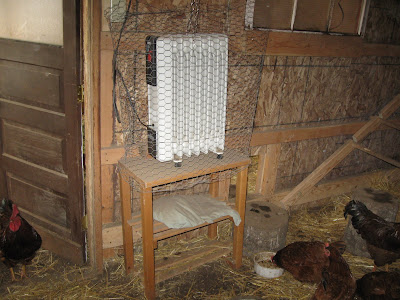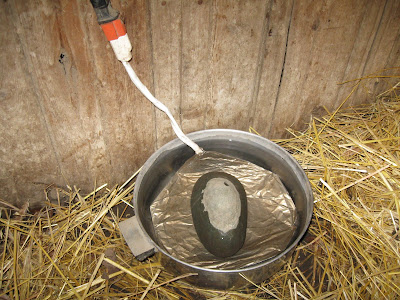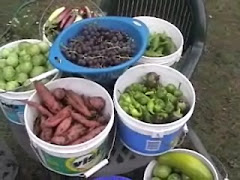 We have a weakness for nuts - I mean we really crave them. I suppose you could say that we are nut-a-holics. In amongst the fruit trees in our little orchard there are also hazelnuts, black and English walnuts. The only problem is that the hazelnuts will not start producing until this fall and the walnuts are still in their infancy. Mrs. H has decided that we will be adding almonds and more hazelnuts this year, but a big nut harvest is still many years away.
We have a weakness for nuts - I mean we really crave them. I suppose you could say that we are nut-a-holics. In amongst the fruit trees in our little orchard there are also hazelnuts, black and English walnuts. The only problem is that the hazelnuts will not start producing until this fall and the walnuts are still in their infancy. Mrs. H has decided that we will be adding almonds and more hazelnuts this year, but a big nut harvest is still many years away.
This fall we bartered eggs and some cash for around 50 lbs of unshelled English walnuts that we hoped would get us through until spring, though they are going fast. My wife picked up another 15 or so pounds of black walnuts from a neighbor who did not want them. We are realizing why now as they taste pretty strong and are next to impossible to shell. After removing the outer husk the nuts were set about the fireplace to dry for a few weeks and are now quite edible.... well the English walnuts anyway.

So we caved in and bought a can of peanuts the other day, not organic as those are impossible to find in our area. I got to thinking about the on-going salmonella outbreak in peanut butter and decided to check it out and see just what it is they do to the peanuts before they leave the field as far as pesticides go. We are usually very careful of late about the few (mostly condiment) food items we still purchase and whether they are organic (supposedly chemical free) or not. So I thought that since they are a legume that grows under ground hopefully they are not sprayed all that much. To my dismay, the first article I came across talked about how they are one of the most carcinogenic and pesticide contaminated food items out there and that's just one of the problems with peanuts.
http://www.thatsfit.ca/2009/05/19/the-problem-with-peanuts/

I did a little research and found insecticide products commonly used on peanuts include phorate, methomyl, esfenvalerate, cyhalothrin, carbaryl, acephate, azadirachtin, cyfluthrin, diflubenzuron, disulfoton, fenpropathrin, indoxacarb, propargite, pyrethrins , rotenone, spinosad, sulfur, and zeta-cypermethrin. As near as I can tell these are all still in use today, it is hard to keep track of what has been banned, is still in use, and what the new poison of the day is.
 Here is some info on the first one in the list, the rest are not much better.
Here is some info on the first one in the list, the rest are not much better.Phorate - Approximately 3 million pounds are used in the U.S. annually, 80% of which is applied to corn, potatoes, and cotton. Phorate is a 'restricted use pesticide' due to high dermal, oral, and inhalation toxicity. Toxic to fish, birds, and not so good for humans either.
The Phorate response in peanuts remains a mystery to researchers.
http://www.peanutgrower.com/home/2003_AprilPhorate.html
A mystery no longer -
Pesticide Spray Proves Disastrous In Salkiana Village, Jalandhar
http://www.countercurrents.org/en-kvm040806.htm
Tea / Bamboo Plantation Owners applied Phorate. Boy dies and over 40 people hospitalized
http://www.getipm.com/our-loved-ones/stories/india-phorate.htm
Pesticides May Up Asthma in Farm Women
http://www.webmd.com/asthma/news/20071228/pesticides-may-up-asthma-in-farm-women?src=RSS_PUBLIC
Thus my long standing love affair with the peanut has come to an end, I will bestow my affections upon a nut closer to home...after all, a peanut is just a lowly legume.



 Especially if you are a flock of hungry chickens.
Especially if you are a flock of hungry chickens.











 Added to our breakfast drink are honey,
Added to our breakfast drink are honey, 






 I could keep them locked up in their sleeping quarters on cold days but instead have given them access to the entire coop. They seem to appreciate this. We built chicken doors with a sliding panel so that they can come and go as they please between the three areas. I have invited them outside on numerous occasions this winter but they have decided it would be best to wait for the snow to melt and have thus far declined my invitations.
I could keep them locked up in their sleeping quarters on cold days but instead have given them access to the entire coop. They seem to appreciate this. We built chicken doors with a sliding panel so that they can come and go as they please between the three areas. I have invited them outside on numerous occasions this winter but they have decided it would be best to wait for the snow to melt and have thus far declined my invitations.
 Once a week we bring in a few buckets of dirt for them to play in and also provide alfalfa hay.
Once a week we bring in a few buckets of dirt for them to play in and also provide alfalfa hay.  Leather Britches - sounds like something out of a western movie, but unlike a robust John Wayne they are just dry shriveled beans. Any beans that we do not eat fresh or allow to mature as dried beans for food
Leather Britches - sounds like something out of a western movie, but unlike a robust John Wayne they are just dry shriveled beans. Any beans that we do not eat fresh or allow to mature as dried beans for food
 or seed as these Scarlet Emperor and Painted Lady runner beans,
or seed as these Scarlet Emperor and Painted Lady runner beans, are made into leather britches also called shuckey beans. I take tender young green, yellow, and my favorite purple beans and hang them on the porch to dry. This is done by threading them onto string or fishing line. That is where they stay until we need them for soup dishes. They are also good eaten out of hand as I do upon occasion. Often times I will put a handful in my pocket and snack on them during the day and they are especially good on long hikes as they take a while to chew. Are they any good? Well let's just say that they are not too bad and if you were really hungry they would be pretty darn good.
are made into leather britches also called shuckey beans. I take tender young green, yellow, and my favorite purple beans and hang them on the porch to dry. This is done by threading them onto string or fishing line. That is where they stay until we need them for soup dishes. They are also good eaten out of hand as I do upon occasion. Often times I will put a handful in my pocket and snack on them during the day and they are especially good on long hikes as they take a while to chew. Are they any good? Well let's just say that they are not too bad and if you were really hungry they would be pretty darn good.

 The larger Swiss chard's have started to rise from a long winters nap.
The larger Swiss chard's have started to rise from a long winters nap.






 mustard,
mustard, chicory,
chicory, spinach
spinach  and mache
and mache have also started to come out of hibernation. This is a good thing because a month and a half of pulling greens from the winter garden is starting to take it's toll on the salad population. I always look forward to February because I know that the worst is behind me and life will start to begin anew under the garden row covers and cold frames.
have also started to come out of hibernation. This is a good thing because a month and a half of pulling greens from the winter garden is starting to take it's toll on the salad population. I always look forward to February because I know that the worst is behind me and life will start to begin anew under the garden row covers and cold frames.




















